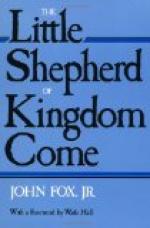One little race of that race in the New World, and one only, has she kept flesh of her flesh, bone of her bone—to that race only did she give no outside aid. She shut it in with gray hill and shining river. She shut it off from the mother state and the mother nation and left it to fight its own fight with savage nature, savage beast, and savage man. And thus she gave the little race strength of heart and body and brain, and taught it to stand together as she taught each man of the race to stand alone, protect his women, mind his own business, and meddle not at all; to think his own thoughts and die for them if need be, though he divided his own house against itself; taught the man to cleave to one woman, with the penalty of death if he strayed elsewhere; to keep her— and even himself—in dark ignorance of the sins against Herself for which she has slain other nations, and in that happy ignorance keeps them to-day, even while she is slaying elsewhere still.
And Nature holds the Kentuckians close even to-day—suckling at her breasts and living after her simple laws. What further use she may have for them is hid by the darkness of to-morrow, but before the Great War came she could look upon her work and say with a smile that it was good. The land was a great series of wooded parks such as one might have found in Merry England, except that worm fence and stone wall took the place of hedge along the highways. It was a land of peace and of a plenty that was close to easy luxury—for all. Poor whites were few, the beggar was unknown, and throughout the region there was no man, woman, or child, perhaps, who did not have enough to eat and to wear and a roof to cover his head, whether it was his own roof or not. If slavery had to be—then the fetters were forged light and hung loosely. And, broadcast, through the people, was the upright sturdiness of the Scotch-Irishman, without his narrowness and bigotry; the grace and chivalry of the Cavalier without his Quixotic sentiment and his weakness; the jovial good-nature of the English squire and the leavening spirit of a simple yeomanry that bore itself with unconscious tenacity to traditions that seeped from the very earth. And the wings of the eagle hovered over all.
For that land it was the flowering time of the age and the people; and the bud that was about to open into the perfect flower had its living symbol in the little creature racing over the bluegrass fields on a black pony, with a black velvet cap and a white nodding plume above her shaking curls, just as the little stranger who had floated down into those Elysian fields—with better blood in his veins than he knew—was a reincarnation perhaps of the spirit of the old race that had lain dormant in the hills. The long way from log-cabin to Greek portico had marked the progress of the generations before her, and, on this same way, the boy had set his sturdy feet.




